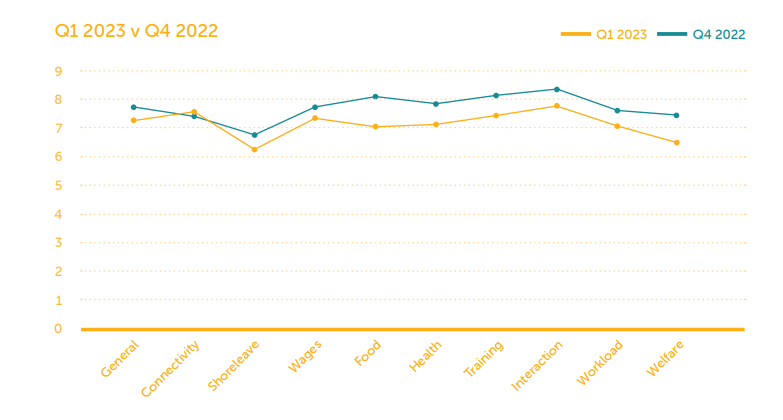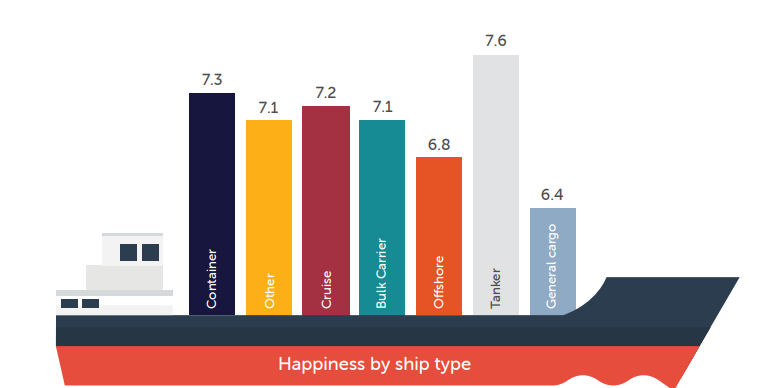The Mission to Seafarers published the findings of its Q1 2023 Seafarers Happiness Index report. The data from Q1 2023 shows a drop against all areas, with the exception of connectivity.
According to the report, in 2022, the satisfaction of seafarers steadily grow, with a high-water mark of satisfaction at 7.69/10 in Quarter 4. Unfortunately, in 2023 the positivity has since fallen away and the generally increasing data trend has fallen back. Once again, the key areas of concern were shore leave and access to welfare services.

General happiness is vital
Two notable and recurring issues are the lack of shore leave and delays in sign-off procedures, these can be hugely problematic, and more seafarers caught up in attempts to make them sign on for longer than they would like to. Whereas in the past many crew would actively seek contract extensions, now this less often the case and instead, there is a strange limbo as companies push for more time on board, but seafarers now want to leave.

It seems that seafarers are struggling to cope with not only too many months on board, but the challenges and the quality of life are causing concern as well.
Indeed, this Quarter seafarers reported feeling less satisfied with their work at sea due to various reasons, such as the usual problems of poor food and demands of paperwork, but we also heard concerns about the lack of effective leadership.
Another significant concern is the absence of health and well-being programmes in some companies. There appears to be a growing gap between the companies that do focus on well-being, and those that don’t.
..said the report.
Contact with family has become cheaper and better almost year-on-year. Advancements in communication technology have made it more affordable to stay connected with loved ones whilst at sea, and there was praise for the innovations that satellite companies have made. Another positive was the fact that online access is seen as a stress reliever. It provides respite from the challenges of daily life at sea as seafarers rely on it as a means of relaxation and entertainment.
We saw a rise in sentiment very much driven by these positives – a sense of improvement, and a recognition that we are hopefully seeing some impetus to make services better.
…said the Mission of Seafarers.
Shore leave
These are all still having a major impact on seafarers’ ability to go ashore, with a huge impact on their wellbeing, as mental health, job satisfaction and overall
welfare are dependent very much on access to get ashore occasionally. The inability to have shore leave or limited opportunities for going ashore were described as making life at sea boring and seriously affecting crew members’ well-being and lowering morale on board.
How happy about wages/salary? 7.32 ↓ from 7.71
The latest results and responses highlight concerns about salaries, with mentions of “decreases” and “stagnation”. There is also a growing sense of disparity
compared to other industries. This is especially concerning as there is something of a brain drain from seafaring.
How happy about interaction with crew on board? 7.78 ↓ from 8.34
It appears that there is a backlash against connectivity as a barrier to better relationships on board when it seems that the disengagement of crew is a symptom of wider issues. They will engage, enjoy, entertain and enter into positive activities if they are provided and if others do the same.
We don’t have control over who sails with us from the compatibility point of view. You just have to hope for the best and make do.
..a seafarer stated.
How happy with your workload? 7.03 ↓ from 7.6
There were four key themes when it came to the question of workload. Seafarers spoke of “unnecessary jobs and corporate bureaucracy”, “increasing workloads and maintenance challenges”, “long working hours”, and “mixed perceptions of rules and regulations”.
The findings underscore the urgent need for efficient workload management, proper planning, and adherence to regulations related to rest hours and other
safety measures on board ships. Shipping companies and relevant authorities must address the concerns related to unnecessary jobs, corporate bureaucracy,
increasing workloads, maintenance challenges, rest hour compliance, and long working hours.






























































